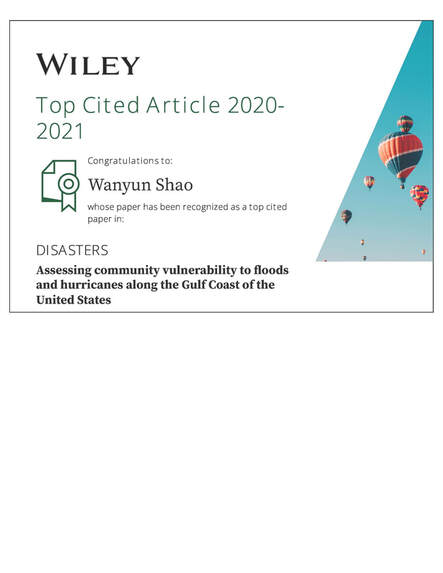|
3/31/2022 0 Comments Our new paper has been published in the International Journal of Disaster Risk Reduction Our paper has been published in the International Journal of Disaster Risk Reduction (Impact factor: 4.32). Below please find the abstract:
"Climate change has posed serious risks to coastal cities around the world. Effective urban disaster management calls for the coordination between the local government and residents. We propose a comprehensive framework to study urban disaster resilience under climate change with New Orleans of Louisiana in the U.S. as the study area. Municipal hazard mitigation must be sufficient to mitigate these hazards. Residents’ risk perceptions are a vital component of social vulnerability and can shape public decisions to increase disaster resiliency. Because climate change is expected to intensify, it becomes important to ensure that residents’ risk perceptions are considered when developing municipal plans to maximize regional resiliency. This research aims to identify a gap in the hazard mitigation process that can be closed to better prepare the community to manage coastal hazards. To achieve this, an online survey is distributed in the New Orleans metropolitan area to determine residents’ risk perceptions and expectations of the local government’s action. Policy analysis is conducted to identify the priorities held by municipal planners in these issues. Although there is no gap in the perception of risk and municipal mitigation of current coastal hazards, there is a gap between the municipal approach to climate change mitigation and the concern and expectation of actions the residents hold regarding the future effects of climate change. The approach to climate change should be reconsidered on a municipal level and new small-scale personal incentives should be promoted to maximize resiliency toward coastal hazards in the future."
0 Comments
Our paper on community vulnerability to floods and hurricanes in the Gulf Coast has been recognized as the most cited paper in the journal Disasters.
Our new paper, entitled "Public awareness and perceptions of drought: A case study of two cities of Alabama" is published in Risk, Hazards, & Crisis in Public Policy. Below please find the abstract:
"Drought poses serious risks to society. There is, however, a lack of timely public awareness and sufficient public risk perceptions of this hazard due to its gradual onset. Timely and adequate public response is conducive to effective mitigation. It is imperative to understand how the public responds to drought. Using data from multiple sources, situated in two cities (Mobile and Huntsville) of Alabama, our study represents a comprehensive effort to understand public awareness and perceptions of drought. We have made several important findings. First, both physical and social contexts can influence public awareness of drought. Mobile is prone to a variety of coastal hazards and displays high social vulnerability. Residents in this city are thus more sensitive to environmental shocks, especially less frequent ones such as drought. Second, public awareness of drought is not constrained within the immediate drought impact area. Governmental declaration or regulation can bring the issue of drought from one area to the attention of the other area within one state. Third, public perceptions of drought numbers are negatively correlated with perceptions of precipitation but positively associated with perceptions of extreme heat. This finding reflects that the public perception of drought is in line with scientific understanding of drought. Drought is by definition persistent deficit of precipitation. Flash droughts can be triggered by heat waves which are more likely to occur during a drought. We end this study with recommendations for future studies." |
|



 RSS Feed
RSS Feed